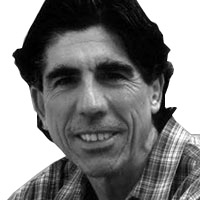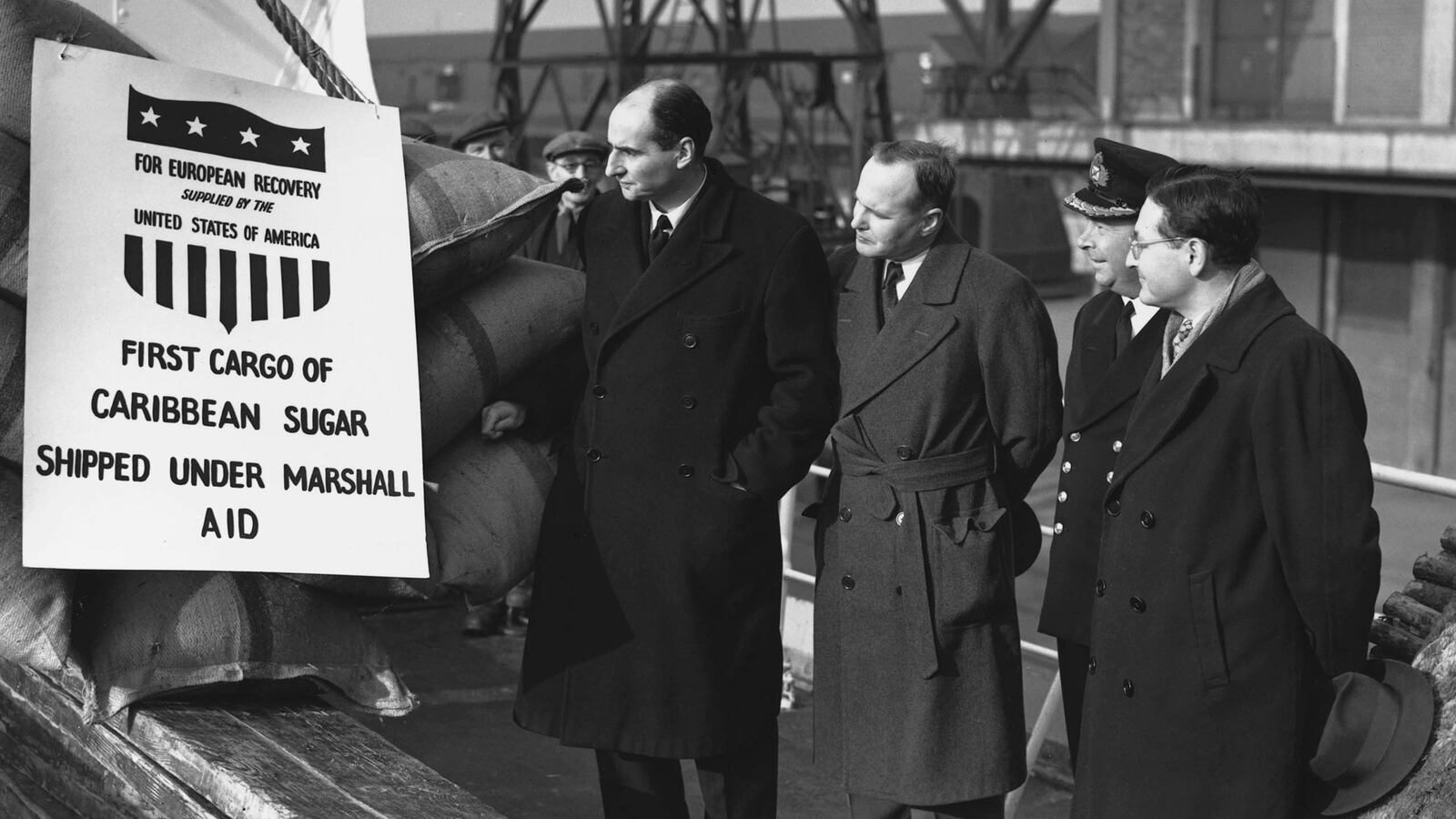It took Secretary of State George Marshall just 12 minutes to deliver his June 5, 1947, Harvard commencement address outlining the principles of the foreign aid program that soon became the Marshall Plan.
This week, as we mark Emmanuel Macron’s decisive victory over Marine Le Pen in the French presidential election, Marshall’s Harvard address—now approaching its 70th anniversary—is worth turning to again. No other document offers as valuable a perspective on what America’s response should be to the turmoil in the European Union, which has, for the moment, survived the Trump-like challenge of Le Pen and her National Front party.
Marshall was at Harvard to receive an honorary degree in recognition of his role as Army chief of staff during World War II, but by the time he finished speaking, he had laid the groundwork for making America into a peacetime superpower and ending the economic rivalries impeding Western Europe’s recovery from World War II.
Americans had helped nations recover from disaster before the Marshall Plan. During World War I, future president Herbert Hoover led relief efforts on behalf of millions of Belgians trapped behind German lines. But for Hoover, Belgian relief was charity designed to deal with a temporary crisis.
The Marshall Plan was different. It was the New Deal applied to American foreign policy. The aim of Marshall, who had been secretary of state just five months when he gave his Harvard speech, was to get post-World War II Europe back on its feet by providing “a cure rather than a mere palliative” for its woes.
At the core of the Marshall Plan was respect for America’s European allies, a belief that America’s future was linked to theirs, and deep suspicion of the Soviet Union’s Cold War motives. Marshall’s objective was to bring about the long-term prosperity of Europe by drawing its nations closer together and using American aid to begin the process.
The genius of the Marshall Plan was that it enabled the countries of Western Europe to look upon one another not as rivals competing in a zero-sum game but as partners with a chance to gain from each other through liberalized trade and interchangeable currencies made reliable by American backing. The name given the American agency responsible for overseeing the Marshall Plan was, tellingly, the Economic Cooperation Administration.
In his speech at Harvard, Marshall stressed that, two years after the end of the war, no recovery was in sight for Europe’s economies. America, which had gotten through the war with its factories and farms intact, was at the time the only nation able to provide meaningful assistance to Europe.
There were humanitarian grounds for providing this assistance. In 1947, the average Britain was getting by on just 1,250 calories a day. But as far as Marshall was concerned, the most compelling reason for coming to Europe’s aid was that without a thriving Europe “there can be no political stability and no assured peace.” The challenge for Americans, Marshall argued, was to understand “the vast responsibilities which history has clearly placed upon our country.”
Such responsibilities did not mean, Marshall emphasized, that America should use its power to dominate Europe. “It would be neither fitting nor efficacious for our government to draw up unilaterally a program designed to place Europe on its feet economically,” Marshall declared. “The program should be a joint one.”
The Soviet Union, which saw the Marshall Plan as a threat to its control of Eastern Europe, soon opted out of the chance to participate it, and Marshall never gave the Soviets a second chance to get in. His postwar meetings with Soviet premier Joseph Stalin, whom Marshall had dealt with in his role as Army chief of staff during World War II Great Powers meetings, convinced him that that the Soviet Union wanted Western Europe’s distress to continue as long as possible.
“It was like a life-line to sinking men,” Ernest Bevin, Great Britain’s foreign secretary, observed after hearing Marshall’s speech. “The generosity of it was beyond our belief.” Other Western European leaders soon realized the chance they were being given by Marshall. By helping all of Western Europe, including West Germany, recover from World War II, the Marshall Plan made it possible to avoid the chaos that followed World War I when the winning powers imposed reparations on Germany in order to enact revenge and bolster their own sinking economies.
The Marshall Plan was not cheap. It absorbed more than 10 percent of the federal budget in its first fiscal year, and by its end, it cost over $13 billion (roughly $579 billion today as the equivalent share of four years of America’s current gross national product). As a result of his role as Army chief of staff in World War II, Marshall had enormous credibility in Congress and the country, and he never sought to minimize the high cost of his plan. “It will impose a burden on the American taxpayer. It will require sacrifices today in order that we may enjoy security and peace tomorrow,” Marshall told Congress.
Despite serving in the Democratic administration of Harry Truman, Marshall was able to win support for his plan from Republicans. The first administrator of the Marshall Plan was Paul Hoffman, a lifelong Republican and president of the Studebaker Company, and in Congress Marshall worked hand in hand with Michigan’s Senator Arthur Vandenberg, the Republican chairman of the Senate Foreign Relations Committee. The result was that Marshall’s campaign to get his plan enacted with the funding it needed proved successful.
On April 3, 1948, just ten months after Marshall’s Harvard speech, President Harry Truman signed the Marshall Plan into law as the Foreign Assistance Act of 1948. Eleven days later, grain elevators in Galveston, Texas, began pouring wheat into the John H. Quick, the first of six ships that formed the vanguard fleet carrying food to Europe.
The “heroic adventure,” as future Secretary of State Dean Acheson called the Marshall Plan, was now under way, and by the end of 1951, when the Marshall Plan, a victim of the Korean War, came to a halt, a new Europe had emerged. Industrial production in Western Europe was now 64 percent above what it had been in 1947 and 41 percent above prewar levels; food production was 24 percent above 1947 and 9 percent above prewar levels.
Equally important, the way Western Europeans now thought of themselves collectively had also changed. “The United States ought not to forget that the emergence of the European Union,” German Chancellor Helmut Schmidt observed on the 50t anniversary of the Marshall Plan, “would never have happened without the Marshall Plan.”
What neither America nor Western Europe imagined were how the developments of recent years in which terrorism, an unprecedented refugee crisis, and the struggles of poor European countries hurt by the euro would erode faith in the European Union.
As Brexit and the tensions surrounding the French election show, the biggest challenge now facing Europe is finding a way to deal with the problems stemming from the shortcomings of the European Union without falling back into the rivalries that existed in 1947. A middle ground is needed, and to achieve it, the spirit rather than the letter of the Marshall Plan is crucial to recall.
Marshall himself had no trouble distinguishing between the spirit and the letter of his plan. When in 1953 he received the Nobel Peace Prize, Marshall was aware that the heroic age of American foreign policy was ebbing, but in his Nobel Prize acceptance speech, he still warned that it was necessary for America and Europe to remain concerned with social justice inside as well as outside their borders.
The difficulties that today’s European Union has been unable to resolve would not have persuaded Marshall that the principles of consent and economic cooperation on which the Marshall Plan rested were mistaken. For Marshall, the great lesson of World War II was clear: “People turn to the false promises of dictators because they are hopeless and anything promises something better than the miserable existence that they endure.”
Nicolaus Mills is author of Winning the Peace: The Marshall Plan and America’s Coming of Age as a Superpower. He is professor of American studies at Sarah Lawrence College.






